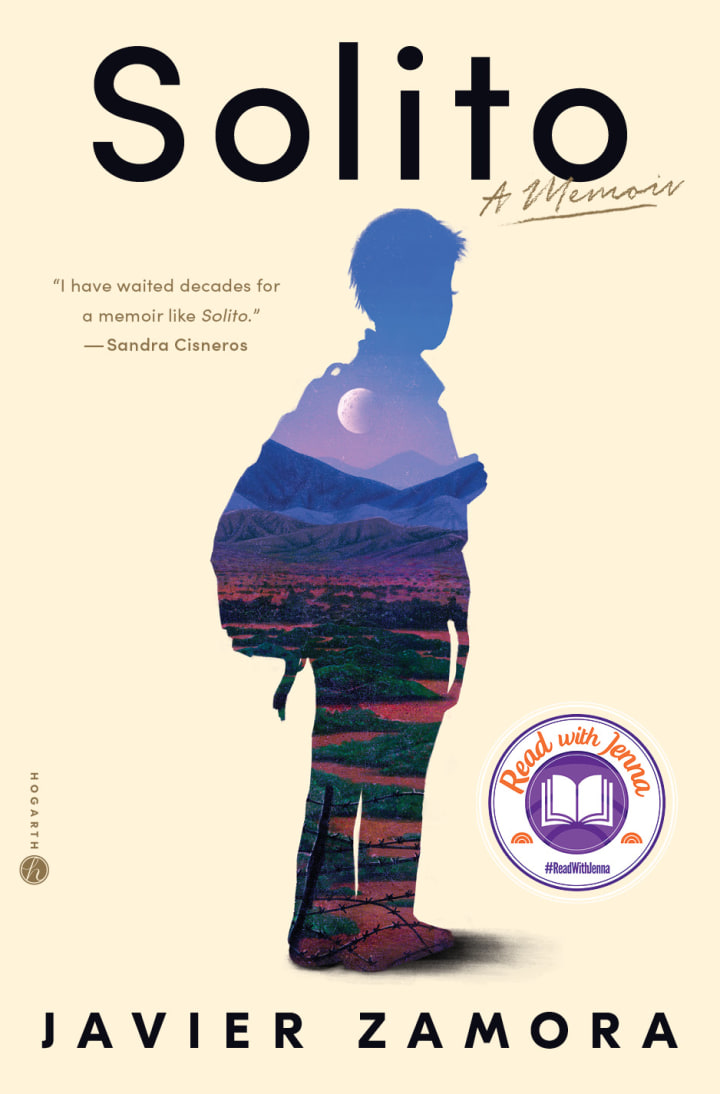September’s Read With Jenna pick is a memoir that Jenna Bush Hager said was about “doing the unthinkable.” Ahead of the announcement, Jenna spoke to "Solito" author Javier Zamora on location in Tuscon, Ariz., where he lived with his parents after joining them in the United States from El Salvador. But the journey to get there was harrowing, and comprises nearly the entirety of his debut memoir, “Solito.”
Zamora, 31, was supposed to take the same route as his mother, accompanied by the same coyote (a slang term for a smuggler that helps immigrants cross the border), taking about two weeks. Instead, he was gone for two months.
'Solito' by Javier Zamora
Speaking to Jenna, Zamora explained the meaning of the book’s title: “Solito means alone,” signifying the weeks he was without his parents and his grandparents, who raised him as a young boy.
What sustained him was the hope of reunion. “I write it as, "I'm gonna see my parents. I'm gonna see them." It’s this optimism and hope that just grew out of me loving my mom and being reunited with my mom,” he said.
Zamora said he hopes that his book makes the topic of immigration impossible to ignore, especially since the book is written from a child’s point of view. “It's very easy to ignore an adult, but a little kid that's with his own voice, telling you, describing the world as he sees it … maybe there will be more empathy," he said.
For him, the takeaway of “Solito” is obvious: “That immigrants are human. It's very simple. And that hopefully you could see us outside of the headlines, outside of our suffering, that even in the suffering there are joyful moments,” he said.
Below, find reading questions as a companion as you read the memoir.
“Trip. My parents started using that word about a year ago—‘one day, you’ll take a trip to be with us. Like an adventure.’” The result is a harrowing migration story, a narrative that is immediate and intimate, in which the reader is essentially there, in the boy’s shoes and inside his head. What did you learn through Javier Zamora’s experience? What surprised or shocked you?
This memoir is told from the perspective of the author as a nine-year-old boy. How do you think that adds to the narrative? Would the book have a different effect if it was the story of an adult’s journey?
From Don Dago to others who remain unnamed, Javier relies on a network of coyotes to get him to America. What was your initial opinion on these coyotes? Did it change over the course of the memoir?
There are many legs to this journey: boat, bus, on foot. Describe the ways each leg was uniquely challenging and dangerous.
The journey wasn’t just physically taxing, but mentally, too. Discuss all that Javier—as a young child—has to memorize throughout the ordeal, from Mexican cities to political facts. Why might he have to pretend he is Mexican?
Aside from Javier, which characters stayed with you, and why?
The author is a poet. How do you think this serves the story he tells, and how does it affect the interplay between intense circumstances and beautiful images and writing?
- The natural world is a character itself in Solito — the animals, the plants, the landscape, the full moon, the sunrise — particularly in the scenes in the desert. Which natural elements stood out for you, and why?
How do you think Javier survived during the seven-week journey? How did you think he sustained himself mentally and emotionally?
How does Javier change throughout the book?
Solito is set in 1999, 23 years ago — and yet we still need immigration reform. Name three ways you think the American immigration system can be more efficient and humane. Can the existing system even be changed?
Javier’s story is also the story of millions who have had no choice but to leave home. Have you or someone you’ve known faced similar circumstances? If so, how has this shaped your life or theirs?
How much did you know about America’s immigration system before reading Solito? Did your view of the issue change? Why or why not?
Toward the beginning of the memoir, Javier lists all the ways he and his mother tried to immigrate legally. Discuss how these attempts are thwarted.
What could you or your neighbors do to welcome immigrant families into your community?
How did you feel at the end of "Solito"?
